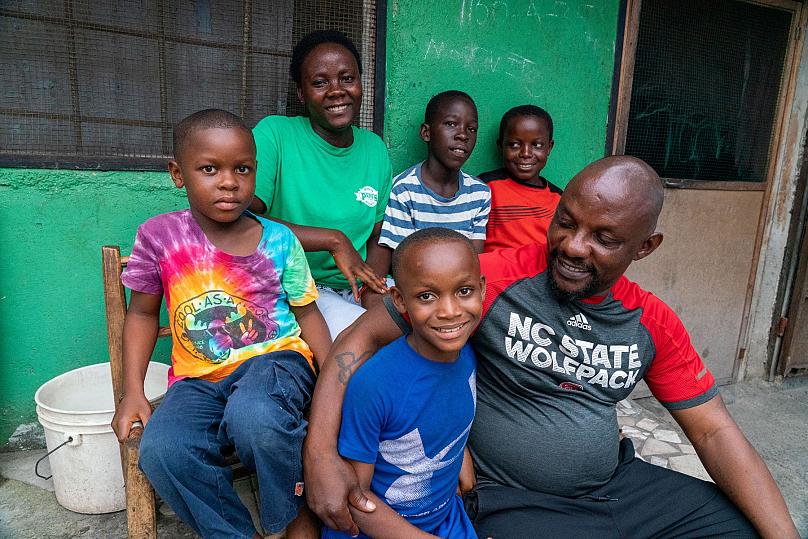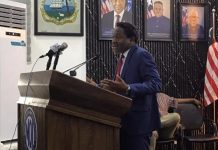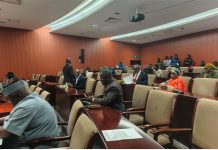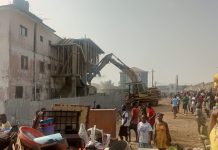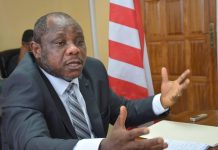Africa-Press – Liberia. After witnessing the murder of his parents and siblings, Morris Matadi was recruited as a child soldier. They put a rifle in his hands and forced him to take an active role in the Liberian civil war.
One day he managed to put down his weapon and flee. But, like many other ex-combatants, the horror of war did not leave him, at least not mentally. He kept returning to the battlefield with vivid nightmares and experienced other symptoms of post-traumatic stress disorder (PTSD), such as anger attacks.
All this in a context where these warriors who once lived by their own rules became the black sheep of society once the war ended and the rules returned. Much of Liberian society cannot forget or forgive their role as enforcers during the war and does not want them to reintegrate.
After exploring the role of traditional masculinity in Liberia’s civil war (1989-2003), we rejoin Liberian journalist Carielle Doe to delve into the aftermath of the conflict, particularly we look into the wounds that are invisible but take longer to heal. The wounds that not only deeply scar the lives of ex-combatants, but of Liberian society as a whole, which still today struggles to confront its past.
But mental health issues linked to men who come back from war are not only harming Liberian ex-combatants. Soldiers around the world have reported PTSD symptoms. The silent wound inflicted by war is the most difficult to heal. It leaves a deep scar of memories.
PTSD patients re-experience the past traumatic situations vividly and these experiences provoke the same fear as the original trauma. They sometimes find relief in venting their anger or resorting to alcohol or drugs.
In Liberia, these men have found group meetings a safe place to overcome the violence of the past. It is a brotherhood to open up to each other about second chances, fatherhood and what constitutes the characteristics of a good man. Gatherings to help them start afresh.
With original reporting and editing by Carielle Doe in Monrovia, Liberia. Marta Rodriguez Martinez, Naira Davlashyan, Lillo Montalto Monella & Arwa Barkallah in Lyon, Mame Peya Diaw in Nairobi, Lory Martinez in Paris, France and Clizia Sala in London, UK. Production Design by Studio Ochenta. Hosted by Danielle Olavario. Theme by Gabriel Dalmasso. Special thanks to Peya Mame and Natalia Oelsner for discovering the music for this episode. Our editor in chief is Yasir Khan.
In this episode, we used music by Liberian artist Faith Vonic. You can find out more about her music in her Youtube, Instagram, Facebook and Twitter accounts. About Cry Like a Boy
Cry Like a Boy is an original Euronews series and podcast that explores how the pressure to be ‘a man’ can harm families and entire societies. Stay with us as we travel across the African continent to meet men who are defying centuries-old gender stereotypes and redefining their roles as men.
The podcast is available in French under the name Dans la Tête des Hommes. Listen to us on Castbox, Spotify, Apple, or wherever you listen to podcasts and don’t hesitate to rate us or to leave a comment.
THE SOLDIERS OF LIBERIA: A MEN’S WAR – TRANSCRIPT
Danielle Olavario [Disclaimer]: Before we start, just a heads up that this episode contains testimonies and stories of war that some listeners may find upsetting or disturbing.
Morris Matadi: While I was sitting I had my arm, so I fell in love with my AK-47. I said now I have somebody to take care of me. This is my mom and this is my dad, this is my family. I’m going to keep it and it’s going to protect me.
Danielle Olavario: This is how Morris Matadi recalls his years as a child soldier during the war. Today he is a father. Morris witnessed the murder of his parents and siblings during the war.
He said they were taken behind a hut by the rebels, and never returned. He heard gunshots, he heard screams, and later saw rebels returning with blood on them and dripping from their knives. Morris realised that was where the rebels took people to kill.
We are in Paynesville, a city right outside of Monrovia, the capital of Liberia. Our reporter on the ground, Carielle, is sitting in Morris’ house, a lower-middle-class building for local standards.
After his whole family was killed by rebels, Morris was alone and became an easy prey to those who recruited child soldiers. They put a rifle in his hands. This is how he remembers that moment: Morris Matadi: All I wanted was to survive. So, you know, you kill or be killed. So that was the situation, my sister.
Danielle Olavario: Lately, these memories don’t often pop up in Morris’ mind. He used to have vivid nightmares. But now he considers that period a closed chapter of his life. He has healed physically, and also mentally. Even though recovering from psychological trauma has taken longer than expected.
Morris Matadi: I was traumatised but now I’m no longer traumatised. Danielle Olavario: Welcome to Cry Like a Boy, a podcast about how the pressure to “be a real man”drives men to be brave, insensitive and always strong. And about how this can damage families and societies.
We are back in the smallest nation of West Africa, Liberia, for the second part of our documentary about the Liberian men, some as young as the age of nine-years-old, who fought in the civil war that ravaged the country between 1989 and 2003. A war of several factions fuelled by natural resources, age old inter-ethnic tensions and the wide gap between the rich and the poor.
These warriors who once lived by their own rules became the black sheep of society once the war ended and the rules returned. Society sees them under a negative light because of the violence they committed during the war. But these soldiers are also victims. They suffered the pressure of traditional masculinity during the conflict and now they carry its trauma. As they’re afraid of losing their reputation as men, they do not speak publicly about the psychological wounds that war inflicted on them.
Alexander Blackie: They have no idea what they are still living with. Trauma, I dare you if you go visit some of those homes and see how they interact with their children. The little child is just a two year old coming to meet daddy. And when you see how daddy will push you away, you know that the traumatic situation that daddy passed you, that he is still living it. We have not really dealt with trauma in Liberia. We are still living with trauma.
Danielle Olavario: This is Alexander Blackie. He works for the Carter Center’s Mental Health Program, which aims to strengthen the weak Liberian public mental health system. Alexander Blackie: We need to sit and discuss the reality: it happened. I did it. Please forgive me.
Danielle Olavario: In Liberia, the UN has surveyed the population living in one of the areas that was most impacted by the war. The study has shown that almost half of the respondents reported symptoms of Post Traumatic Stress Disorder, or PTSD.
However, there are still many people here who do not believe that medical treatment is possible for mental illnesses. The government itself only introduced a mental health policy in 2009 and a mental health law in 2017. Carielle Doe, our reporter on the ground explains how Liberians perceive mental health.
Carielle Doe: For the thousands of people living as labourers and making only a few dollars a day. A mental health day could be a day with no food. But as we know, trauma does not care about one’s circumstances, and it finds ways to let you know it’s there. When a person experiences a mental health crisis, especially in rural areas, it is often attributed to black magic curses from jealous neighbours or demonic possession. With few mental health resources available in Liberia and very little information available about how and where to find such help. People in crisis often turn to churches or traditional healers to address their problems. In extreme cases, those without strong support networks can end up homeless and roaming the streets, often the subject of pity, ridicule and fear. Others use drugs to escape.
Danielle Olavario: Mental health issues are common amongst those who return from war, all over the world. And American and European movies have often depicted PTSD.
PTSD knows no boundaries. It overcomes the limits of space, but also of time. PTSD in soldiers was already documented in ancient Greece. Just like today, these men suffered from persistent nightmares after coming home from war.
Let’s move on to more recent times. During the American Civil War, some soldiers described suffering from anxiety and feeling constantly on edge. People called it “soldier’s heart”.
But it was during World War I that soldiers experienced PTSD at its worst. People called it “shell-shock,” this psychological trauma required a formal treatment.
Gary Barker: And the whole construction of masculinity is all over the world, for the most part, has been that men don’t seek help. We’re not allowed to ask for it. Whether we look back at Europe in World War I, where we started to come up with this idea of “shell shock”. But it was an unmanly thing. Real men didn’t need help.
Danielle Olavario: This is Gary Barker, the founder of Promundo, an international NGO that aims at engaging men in the discourse revolving around gender equality.
Gary Barker: Men coming out of World War I and II, for that matter, were considered weak men if they talked about their war experiences of anything other than glory.
Danielle Olavario: Psychological trauma is like a wound: the skin heals, but it leaves behind a scar. In the case of soldiers, the silent wound inflicted by war is the most difficult to heal. It leaves a thick scar of memories behind.
With PTSD, trauma tends to come back again in a destructive form: patients re-experience the past traumatic situations vividly and these experiences provoke the same fear as the original trauma. In Liberia, and around the world, soldiers with PTSD find relief in venting their anger. Sometimes they resort to alcohol or drugs.
Gary Barker: It’s easy to look with a sense that young men, adult men involved in conflicts are damaged and they’re walking time bombs and they’re harmful. And so as much as that may remain unspoken, there’s a huge amount of belief that the men involved stay away from them, don’t give them jobs, don’t let your children hang out with them and let your sons or daughters marry their sons or daughters. So I think how do we move away from those were the men who caused harm, where they are, they bring damage to our communities, to those are men who need help.
Danielle Olavario: We are back with Morris’ family. At the doors of his one-storey olive-coloured house, surrounded by palm trees. Outside there is music, there is noise, there is bustle.
Since the end of the war, he has come a long way to settle his home in this neighbourhood. He went from a child soldier to a counsellor. Today, he is helping others to overcome trauma.
Carielle Doe: For those who have fathers still battling their trauma and drug addiction, Morris decided to provide educational support. What began as an after school tutoring programme for seven children grew into the 235-student Rilo Foundation Educational School System, where the children of ex combatants and drug addicts attend school for free.
Morris says that when people meet him and don’t know about his past, they are surprised to discover that he was once a child soldier. Morris Matadi: I participated in war when I was a minor, what you tell me ‘you lie Morris’. So I will go online and share my photo in uniform. What? You appear all different. Danielle Olavario:Here is what Gary Barker thinks about the social rehabilitation of former soldiers.
Gary Barker: What it takes to bring someone back from that takes a huge number of years. And some of the work that we did around and have supported around psychosocial support for that is just how much your whole worldview is framed around the world is out to get you the home that you thought you had before. They’re now all your enemies. And yet men who, when we gave them a chance to talk about it. They longed for a family life, longed for a connexion. They longed for a community where they’re not feared. They are able to see how horrible it is to live your life, being feared all the time.
Danielle Olavario: It is hot and sunny outside and Morris takes our reporter Carielle to walk with him around his neighbourhood. On their way they meet his neighbors. It is a very close community where he has found his place: he is highly respected. Carielle Doe: So that anger doesn’t rise? Morris Matadi: No, I suppressed it. I practise every day to suppress my anger.
Danielle Olavario: For the past 14 years, since the end of the war, Morris has been working on himself to overcome his trauma. He does it by focusing on the big picture and he also does small daily tricks to avoid getting caught up in awful flashbacks.
Morris Matadi: I walk away and let it go. And let it go. To get rid of the trauma they have to accept change and change comes from within Danielle Olavario: It can be difficult for an individual alone to find a solution to their trauma. More often than not, it is necessary to seek help.
In Liberia, former soldiers have found relief in support groups. Support groups were also the solution that the miners we encountered in episodes 9 and 10 of our podcast implemented to escape toxic masculinity. There, soldiers alike find a safe place to share their emotions in the former wartime comradeship.
Danielle Olavario: Today these brothers in arms ask themselves if it’s possible to move on, if one can become a good man, even after inflicting so much violence.
Emmanuel Keloh: Because a good man is not about who you were before. What matters, understanding how to move with people for the people who sit there in your shoes, understanding the relations of people, understanding society, knowing how to relate and knowing how to accept your wrong. So I believe a soldier can be a good man.
Carielle Doe: Emmanuel Keloh works to rehabilitate former combatants. He first began this work as part of the National Excombatants Peacebuilding Initiative in 2006. Now he has impromptu group counselling sessions on his own with ex combatants. These men are what one may call success stories. They work. They have relationships with friends and family, and they have learnt skills to recognise and hold triggers.
Emmanuel Keloh: So people are not willing to accept these people back. And I think that the only way forward is we all come back together. These people are your children, our family, you should accept them back into society.
Danielle Olavario: During these meetings, these ex combatants find a safe space to share their experiences. They talk about war and how to cope with trauma in times of peace. About being rejected by society, second chances and fatherhood.
Many share the same goal: being a good person and a good father. They don’t want to pass their trauma onto their children. Jonathan: Why am I doing this? I’m a decent person, I’m a good person. After you start having children, you want your children to look at you as a good person, as a father.
Danielle Olavario: Gary Barker agrees with the opinion of this former soldier. Gary Barker: I do think for men in particular, where, you know, we’re often behind this facade of of not sharing the impact of trauma, where our feelings are or our connexion to others, that to become a father and to be involved as a caregiver is, I think, a powerful motive for change.
Danielle Olavario: Back in Morris’ home, his girlfriend Yankee and their son are cooking together. Morris has four children. Two were born during the war, and two after. He recognised he was two different men during and after the conflict, therefore he has also been two different kinds of fathers.
Morris Matadi: Joe, he loves violence. Because when he was born, when I had Joe, the nature of violence was in me. So trauma by nature can be transferred to a child whose father is traumatised. Danielle Olavario: So is it possible for these former soldiers to be fully reintegrated into society?
Gary Barker: Whether it’s Liberia, Sierra Leone, DRC, Rwanda, there’s generations of young men who were drawn into that really with very little choice and where we need to kind of shift our analysis or our thinking about them from there. The ones who caused horrible harm, they were also shaped to be those harmful men. And we’ve got to figure out what kind of psychosocial support and trauma support and livelihood support to bring them back into our shared humanity.
Danielle Olavario: There is still something in Morris of that boy who hugged his AK 47 as if it were his whole family. He can’t escape it – it is his past. But he doesn’t want his past to define who he is today. He wants everyone to see the efforts he made to put everything behind, to become a good father, a good partner and a good neighbour. His efforts to heal his invisible war wound. He wants to stop being the fierce soldier he used to be. He simply wishes to fit back into society and be a good man.
Morris Matadi: A good man is a man who presents himself in a calm manner, a good man is a man who controls his anger and acts more intelligently when he is angry as a good man. A good man is the one who should take responsibility for his people. A good man is a man who lives with his friends. A good man is a man who suffers to provide for his family. A good man is a man who will never forsake a family.
CREDITS:
You are listening to Cry Like a Boy. In our following episodes we will have a conversation about the documentary we have just listened to. We will be joined by Nobel Peace Prize winner Leymah Gbowee. Her work to unite Liberian women of different ethnicities and religions with a common goal, to end the war, was fundamental in bringing the conflict to an end.
If you’re new to the series, check out our stories on redeemed husbands from Burundi, gay men from Senegal, traumatised miners from Lesotho and fallen heroes/migrants from Guinea…all African men fighting to defy the strict gender roles and rules. You can visit our website for more original content, videos and opinion pieces. I am Danielle Olavario and it has been a pleasure to accompany you on this journey..
In this episode, we used music by Liberian artist Faith Vonic. You can find out more about her music on her Youtube, Instagram, Facebook and Twitter accounts.
With original reporting and editing by Carielle Doe in Monrovia, Liberia. Marta Rodriguez Martinez, Naira Davlashyan, Lillo Montalto Monella & Arwa Barkallah in Lyon, Mame Peya Diaw in Nairobi, Lory Martinez in Paris, France and Clizia Sala in London, UK.
Production Design by Studio Ochenta. Theme by Gabriel Dalmasso. Special thanks to Peya Mame and Natalia Oelsner for collecting the music for this episode. Our editor in chief is Yasir Khan.
Our podcast is available on Castbox, Spotify, Apple or wherever you listen to podcasts. If you liked this episode, please give us five stars and leave a comment. We love reading those.
Share with us your own stories of how you changed and challenged your view on what it means to be a man. Use #crylikeaboy. If you’re a French speaker, this podcast is also available in French: Dans la Tête des Hommes.

